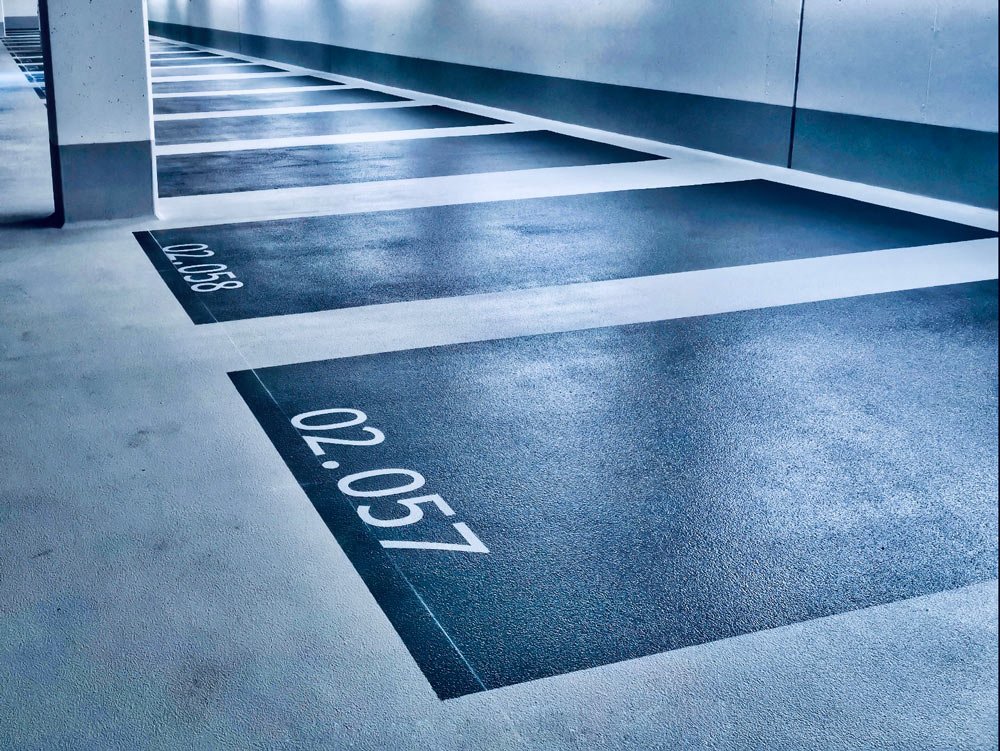Intelligent parking space management
March 01. 2022 - 5 min. reading time
Smart solutions for efficient distribution of your parking spaces.
by Rüdiger Gutfleisch
The mobility transition has already begun in many areas. However, individual transportation still plays a major role in society. For this reason, many companies still need ways to provide employees and guests with parking space. However, the valuable resource of parking spaces should be used as efficiently as possible. There are various options for using the available parking space.
Parking without booking
In general, the simplest option is to allow all employees to use the parking garage. This can make sense if there is enough parking space available and there is no bottleneck. Use can be restricted by means of access control. However, if there is not enough parking space available, situations of full parking garages and frustrated employees can quickly arise. Employees then either have to occupy a parking space early or switch to other parking options. An employee cannot always estimate when parking space will become scarce.
Single seat booking
With an individual parking space booking, an employee reserves a specific parking space within a parking garage or parking area. They can quickly recognize when there is no parking space available for certain days and either look for an alternative or avoid visiting the office on that day. When making a reservation, however, the employee commits to a specific parking space, which they must then use. This means that they cannot stand in the nearest parking space, but must explicitly find and use the parking space they have booked.
If an employee accidentally uses the wrong parking space, there is a chain reaction, as the next employee who wants to use the parking space will park in another free parking space. This very quickly leads to the actual reservations no longer working. Therefore, in practice, it does not always make sense to make every parking space bookable, but to limit this to certain parking spaces such as guest parking spaces and parking spaces with an e-charging station.
A check-in function can also ensure that a booked parking space is actually used and is automatically released after a certain time if the parking space is not needed after all. If a system is used that automatically recognizes when a parking space is occupied, this check-in can also take place automatically. The same applies to check-out.
If the system is additionally equipped with an access control system such as Dormakaba it can also be ensured that only persons who have a booking can enter the parking garage. As an extension, customers can be granted access with a barcode, which can be issued by systems such as Comydo for example. A guest is sent a barcode with which he can authenticate himself at the access control. A system with automatic license plate recognition is also conceivable here. For data protection reasons, however, this is not always desirable or sensible.
Alternatively, parking spaces can also be permanently allocated to employees. However, this does not achieve optimum utilization of the parking space.
Parking space booking via contingents
Instead of booking a specific parking space, it can make sense to make a booking from a contingent of parking spaces. In this case, reservations are not made for a specific parking space, but from a contingent of parking spaces. Allotments can be defined flexibly for individual locations, parking garages and also possible tenants. The advantage of this is that the employee is no longer tied to a specific parking space, but can park in any free parking space. This prevents accidental parking in the wrong parking space. Searching for a specific parking space is also avoided, as in principle any parking space from a specific area can be used. A parking guidance system can also be used to show users which parking space they are allowed to park their vehicle in. LED lights can be used to visually inform users which parking spaces are available to them. For example, a green light indicates a free parking space, whereas a red light indicates a closed parking space.
Convenient booking via an app
A smartphone app helps with the convenient search and booking of a free parking space. A reservation can be made in advance. The reservation can be filtered according to criteria such as charging station or disabled parking space. The app can also help with navigation to the relevant parking spaces.
Evaluation
By evaluating the bookings and, if available, the occupancy of the parking spaces by sensors (individual space detection), the utilization can be recorded in real time. The current occupancy can be checked at any time and optimized if necessary. Parking times and length of stay can also be recorded. The evaluation can be broken down by building and floor level right down to the individual parking space. By evaluating the historical data, trends can be identified and the parking space can be optimized for economical operation. In this way, the available parking space can be used efficiently.
Conclusion
Today's technology offers a simple way to make efficient use of existing parking space and make it conveniently available to employees. Implementation can be carried out holistically in a complete solution for building digitization. Intelligent parking space management is thus a component of a digitization solution that is integrated into the existing building technology. Solutions from MazeMap Workplace as a platform for digitized buildings help to implement projects quickly.
Get started with MazeMap Workplace now
Contact us today. We will get back to you shortly. You are also welcome to book a demo appointment directly.
Call us at
+49 69-566086786
Non-binding demo
Book an appointment now
You can rely on MazeMap Workplace
Easy integration: Seamless integration into existing systems.
High usability: user-friendliness and intuitive operation.
Strong security standards: Maximum security for your data.













